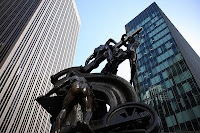Leverage- The Dirtest Word in the Banking Crisis
Posted by
Lemizeraq
Labels:
financial crisis,
financial products
 In my first job, I worked in the margin department of a local brokerage. As I was doing marketing of the product, the manager of that unit taught me the essentials of how the margin product worked.
In my first job, I worked in the margin department of a local brokerage. As I was doing marketing of the product, the manager of that unit taught me the essentials of how the margin product worked.Something that stuck in my mind serving customers was the fact that buying on margin is dangerous. The product essentially uses your cash deposited to the brokerage or stocks pledged as collateral. If the market goes the direction you predict, the stocks you buy using leverage magnifies your returns. However, when it goes against you, you will get a margin call and if you cannot meet it, your stocks no longer becomes yours and is force sold.
A gentleman who was in his 50s came unsolicited one day and asked to open a margin account. After launching through the spiel of explaining the intricacies of the margin product and the force selling part, the gentleman thanked me profusely for pointing out the dangers of the product and did not sign up for the product.
I felt better after that episode than after all the other clients who signed on despite the warnings of the margin product.
Wouldn't the company I was working for lose out? I don't believe so, because the gentleman who got my full unvarnished account of the dangers of the product told me that he's going to ask his daughter to come and look for me to open an ordinary stock trading account.
Recently in the papers, there was a report of an interesting case where a lady in her late 40s was actually rejected by the local bank OCBC in her quest to buy unit trust(mutual fund). Although the lady claimed to know what she was doing, and has invested in unit trust with OCBC before, her request to buy more unit trust was rejected by the bank after they did an analysis of her financial position.
I gained a little bit more respect for that bank which hopefully had learnt a valuable lesson from the ninja (No Interest, No Jobs or Assets) loans shenanigans that unscrupulous banks and mortagage companies in USA and the rest of the whole had engaged in.
The huge amount of leverage that mortagage institutions, investment banks, superbanks like Citibank and insurance firms like AIG had undertaken beggars belief. An average securities firm leveraged its capital 27 times in 2007.
A very good old article in the Economist, A Short History of Finance, published on the 16th October, chronicles the increasing use of leverage in modern finance and the rise of asset based securitisation.
The next time you buy a financial product, ask until you understand what it is you are buying. Insist on doing a full review of your financial situation and put down an honest assessment of your risk tolerance.
If you don't know what it is you are buying, do yourself a favour and educate yourself on the financial product first before you do.
Related Posts
Subscribe to:
Post Comments (Atom)
Disclaimer
reliance placed on information provided in the blog.
Shares and financial instruments illustrated in this blog can go down sharply or in certain instruments suffer total loss on the initial investments. Investors are advised to make their own judgment on the information provided and consult their own financial advisors or consultants as to the suitability of the products illustrated to their particular financial needs and objectives before acting on any information contained herein in this blog.



March 28, 2009 at 7:47 PM
Your blog is an organized one (^_^)
Post a Comment